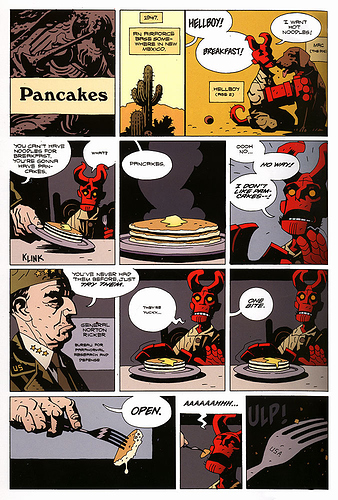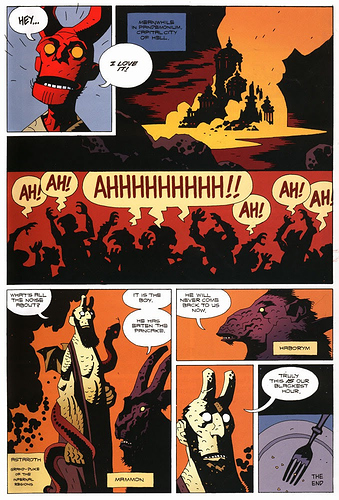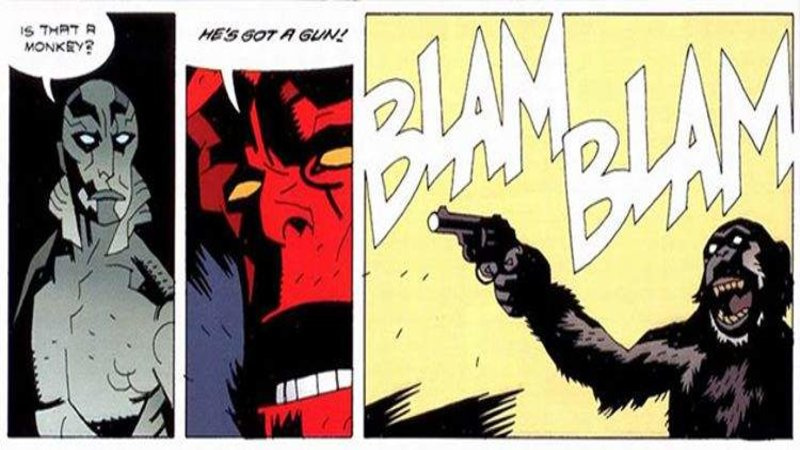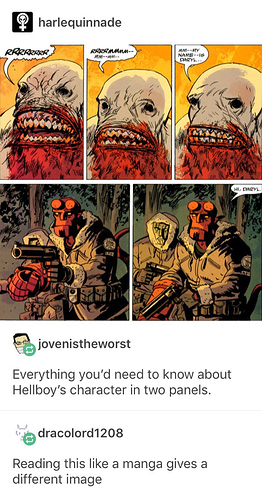This is a companion discussion topic for the original entry at https://www.quartertothree.com/fp/2019/04/16/qt3-movie-podcast-hellboy/
This is a companion discussion topic for the original entry at https://www.quartertothree.com/fp/2019/04/16/qt3-movie-podcast-hellboy/
“Hellboy. Hellboy never changes.”
Oh, wait. It did.
I take umbrage with Tom’s dismissal of criticism of Hellboy’s climax. I’m all for comic book movies wrapping up in creative ways that aren’t simply punching contests.
Hellboy, though, is not a thoughtful, clever, or subtle character. He shoots stuff and he punches faces. His confidence that every problem can be overcome by smashing the shit out of it is one of his main traits. Figuring out a way to one-up the bad guy that didn’t involve a fight was a bit of character growth that didn’t feel earned.
And I just thought that the demons were cool. When that one Bone Tomahawked that dude’s crotch I was like “YES! Finally! This is why I came to this movie!”
Well, those aren’t claims I was trying to make. Although I would argue that a Nazi half-demon sent to destroy humanity struggling with his human side to save humanity is moderately clever. As far as comic books go.
But my point is that the resolution of the movie isn’t someone punching harder because he’s the lead character. The resolution is the decision Hellboy* makes. That’s how the good guy prevails over the bad guy. With a decision, not a narratively convenient burst of strength, a la Wonder Woman or Spider-Man: Into the Spider-Verse or pretty much every superhero movie that whiffs its third act. The same is true of Constantine, Captain Marvel, and Dark Knight, all better movies, but all examples of the resolution being a decision and not a tryhard white-hat superpunch.
-Tom
* yep, here I am, a grown man talking about a character named “Hellboy”
Fair enough. I agree with you in principle and I understand what you’re saying here. I think this is the movie that should have ended with a convenient burst of strength, but it’s definitely a case of being familiar with the source material screwing things up for me. The Hellboy of the comics loves punching monsters. If I’m bummed because the one in the movie opts to go another way, that’s on me.
There was definitely a lack of use of that fist.
In fact, one of the things I meant to bring up was the movie’s lack of “dumb fingers”. We’ve talked before about the Predator’s dumb bendy inconvenient latex glove fingers, and that’s why I did the 3x3 about favorite freaky fingers. Hellboy had some really good freaky-fingered hands, from Baba Yaga to Daniel Dae Kim’s werejaguar to the pigman and so forth. Some really nice monster hands, usually CG. But then there was the big glove on David Harbour’s arm. Ugh. Not only did he not get to do much with it, but it seemed mostly like a half-assed prop, hanging there, inert. A better Hellboy would have it moving, grabbing stuff, flexing, and so forth, being used like a real hand, probably with a mix of CG and practical effects. For instance, look at Charlize Theron’s arm in Fury Road. Great subtle stuff, that doesn’t necessarily draw your attention, but it does reward your attention. But this Hellboy felt like it just stuck a prosthetic on an actor’s arm and called it a day. The only real use it got was as a gag at the Osiris Club.
-Tom
“Strip club in Jersey? Yeah, I know it.”
Rasputin gets Hellboy to use his fist to open the Tunguska door in the first movie. Because it’s actually a key. True story.
-xtien
“Why does this book have so many words?”
I haven’t seen the movie, but I did read 150+ Hellboy comics, and I have to dis-agree with you. Hellboy does love punching things, but the character is a lot more interesting than just that. A ton of his stories focus on questions of loyalty(1*) and identity(2*) , and many more of his stories hinge on clever solutions to metaphysical or tactical problems. He’s also surprisingly diplomatic; his personal near-invulnerability combined with his comfort in dealing with the dead, undead, magical, fey, and demonic means that he can take a talk-first shoot-second approach to basically every situation(3*). He’s the basically the Captain Picard of comic book heroes.
Footnotes:
1)
“IT’S THE SAME THING!!!”
That exchange alone has convinced me to see Hellboy.
Never argue with someone who’s packing footnotes is a good adage, I think. My recollection is such that I’m surprised by a Picard comparison, but your take on the character certainly makes me like this new movie a whole lot less. What they’ve culled from the books isn’t very different from Del Toro’s take. A sulky, petulant drunk who has problems with authority and fights with his dad a lot (I don’t recall much of that, either). Hence my annoyance that they only cribbed his penchant for violence for like, one fight completely unrelated to the plot and one mini-boss battle.
Btw, both names “Vivian” and “Nimue” (pronounced nim-you-way) have been used in translations of the King Arthur legend. She’s the Lady of the Lake.
I think there’s something ineffable about Mignola’s beautiful art that just doesn’t translate to live action. I kinda wish the Hellboy movies were animated.
I loved the Hellboipsis. Naked Arnold’s half-senile nattering about whatever anecdote he’s been telling over and over for 30 years that some random thing on screen reminded him of is the breakout comedy hit of 2019.
Tom, I totally agree with your disdain for movies which end with the hero just believing in themselves hard enough to punch harder and win.
But I don’t think Spider-Verse quite falls into that category. The movie sets up the whole idea that what makes someone a true Spider-Person is that they keep getting back up when they fall down. That is Peter B’s arc – he had given up but his adventure with Miles convinces him to go back to MJ and try again (both his marriage and being Spider-Man).
Mile can’t defeat Kingpin by punching. Kingpin is too strong. But his decision to keep getting back up again, even when Kingpin is standing right there, ready to murder him like he did Peter A, is what lets Miles lure Kingpin close enough to knock him out with his venom touch.
(Yeah, you have the more touchy-feeley sense that Miles is able to get the hang of his powers by sorting out his fraught relationships with his dad–in the dorm room, and his uncle–using the “Hey” implies he can still be grateful for his uncle despite finding out he was in many ways a bad guy, but I think that stuff is also more nuanced and developed than the typical Win By Trying Harder trope.)
“Excuse me sir, but this is a Hellboy podcast.”
But I feel like Tom’s point that Dingus was missing in the podcast is that winning with the same kind of punching or other violence that failed for the past 10 minutes but succeeds now because the hero thinks of his love interest and tries harder is different from winning with a specific kind of punching that the movie sets up rules why it should work when the previous attempts have failed.
Regarding the “is Excalibur winning by punching” argument, I think the more certain is the power of a weapon, the more the usage is about the decision rather than the skill or cunning or morale of the user. For example, Infinity War has a villain that punches less and less as it goes on; his final violent act was entirely a decision, though admittedly a decision he’d committed to years ago.
If Hellboy understood the rules of Excalibur then beheading the witch wasn’t a contest of power, just a decision to kill her.
However, there was a meta-punchout happening by using Hellboy’s dead dad to contest the influence of the witch that rendered all that moot; if Ian McShane could win his rhetorical attack, it was guaranteed Hellboy would triumph. This was unfortunate because modern day application of the rules of Arthurian magic is more interesting to me.



